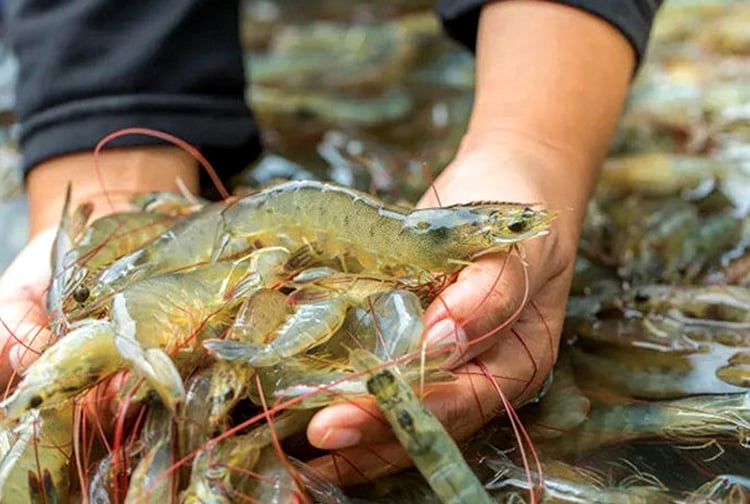December 12, 2025 | 14:02 GMT +7
December 12, 2025 | 14:02 GMT +7
Hotline: 0913.378.918
December 12, 2025 | 14:02 GMT +7
Hotline: 0913.378.918

Using renewable energy will significantly reduce carbon emissions in whiteleg shrimp farming. Illustrative image.
According to the Agency of Foreign Trade of the Ministry of Industry and Trade, China - the world's largest seafood producer - has conducted the first study assessing the carbon footprint of whiteleg shrimp (Litopenaeus vannamei) farming in a recirculating aquaculture system (RAS). The results indicate that this system has the potential to reduce emissions when powered by renewable energy and optimized for farming efficiency.
The study was carried out at four shrimp farms in Guangdong province, using a life cycle assessment (LCA) approach that tracked the process from input to the harvest of market-sized shrimp. The recorded carbon footprint ranged from 13.8 to 14.9 tons of CO₂ equivalent per ton of shrimp produced.
Electricity accounted for the largest share of emissions (over 50%), followed by biological emissions from shrimp respiration, feed, and construction materials. Notably, farms using solar energy were able to reduce emissions by up to 92% compared to those using coal-generated electricity.
According to the researchers, biological emissions could serve as indicators of growth performance and farm management efficiency. In addition, infrastructure plays a significant role in total emissions, particularly in large-scale shrimp farming operations.
This study sheds light on both the challenges and opportunities for China’s shrimp industry to adopt high-tech, low-emission, and environmentally friendly production methods in the future.
Translated by Phuong Linh

(VAN) The Sustainable Agricultural and Forestry Production Development Support Project in Angola is key to both advancing sustainable development and guaranteeing national food security.

(VAN) According to Deputy Minister Nam, women are as capable as anyone when granted the opportunity to experiment and innovate.

(VAN) Dr. Fred Unger, former Regional Representative of ILRI in Asia, is honored as a pioneering expert who helped establish Viet Nam’s One Health and risk-based approaches in food safety.

(VAN) By joining the carbon market, Hoang Lien National Park can reinvest revenues into conservation and improving community livelihoods.

(VAN) Bach Ma National Park will continue to conserve biodiversity in ASEAN, aligned with sustainable agriculture and environmental development goals.

(VAN) Pu Mat National Park is a green gem of Nghe An province, and its value is further elevated after being officially recognized as an ASEAN Heritage Park.

(VAN) EU expects Viet Nam to seize the chance and comply with green standards to make strong breakthroughs in exporting high-quality agricultural products.